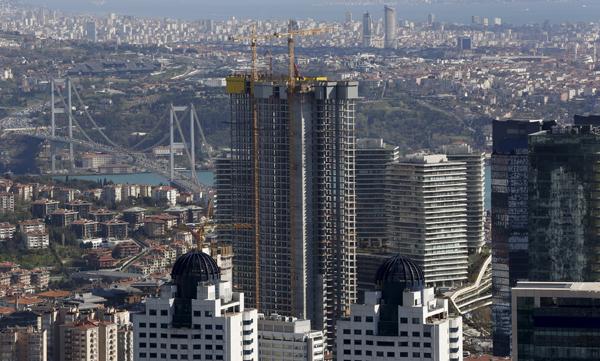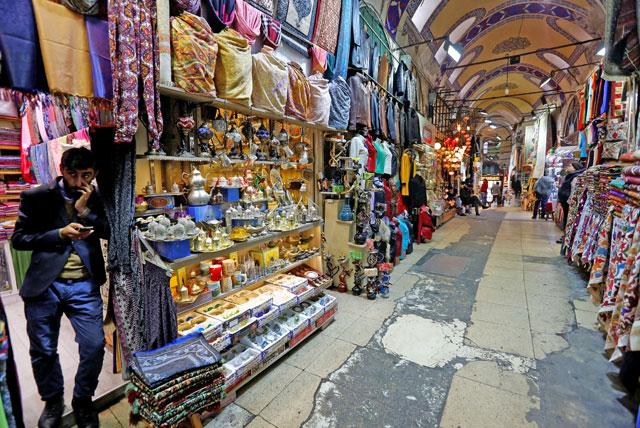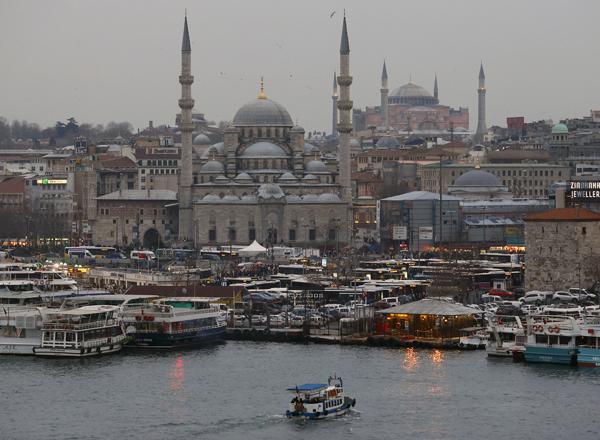You are here
Turkish conglomerates race into construction, hunting quick profits
By Reuters - Apr 27,2016 - Last updated at Apr 27,2016

New skyscrapers under construction are pictured in Istanbul, Turkey, on April 10, 2015 (Reuters photo)
ISTANBUL — Turkish conglomerates are racing to add high-end apartment blocks and office towers to Istanbul's rapidly changing skyline, turning to one of the world's most profitable real estate markets for quick returns as other parts of the economy suffer.
Anadolu Holding, which has interests in banking, retail and brewing, plans to venture into real estate with two developments in Istanbul this year, while Aksoy Holding, an energy-to-tourism conglomerate, is building a luxury residential complex on the Aegean coast and plans another project in Istanbul.
Construction lies close to heart of President Recep Tayyip Erdogan, who sees big real estate projects, both public and private sector, as a showcase for Turkey's rising prosperity, as well as a vehicle for job creation and winning loyalty at the ballot box by increasing the supply of new housing.
But some economists warn that such investments risk fuelling volatile consumption-led growth and undermining government efforts to put Turkey's economy on a more sustainable path.
They say they fail to address an under-investment in manufacturing technology that could erode the global competitiveness of Turkish industrial products and exports.
"Investments in construction create a doping impact in the economy in the short run but these are not quality investments boosting productivity," said Haluk Burumcekci, an economist who runs the Istanbul-based Burumcekci Consulting.
"And in the long run such investments do not help a sustainable growth model," he added.
The government says it is committed to ensuring sustainable growth. It has pledged reforms to boost labour productivity and household savings, and make Turkey one of the world's top-10 economies by 2023. Output grew by a stronger-than-expected 4 per cent last year, but it was largely consumption-led growth.
Turkish house prices have jumped 70 per cent since 2010, according to Turkey's Association of Real Estate and Real Estate Investment Companies (GYODER). Turkey topped global rankings with price rises of 18 per cent last year alone, according to the Knight Frank Global House Index.
Strong population growth and demand from investors elsewhere in the Middle East, who see Turkey as a relative safe haven in the region, are fuelling the construction boom, despite persistent worries among some investors about a housing bubble.
Demand for new homes stands at least half a million a year, almost doubling with the need for renovating existing houses, industry executives say. They estimate more than a third of Turkey's 20 million residential buildings need refurbishment, many to meet tighter earthquake regulations.
"The potential is still there," indicated Omer Faruk Celik, head of the Real Estate Developers and Investors Association. "Even though profitability is not very high in construction, the shorter return period on investment makes it more attractive than other areas of industry."
New projects
Anadolu Holding, best known for its beer maker Anadolu Efes, said its foray into construction was driven by a need to create cash flow and by the ease with which it could find foreign financing for such projects.
Anadolu Efes has suffered in Turkey from rising taxes and regulation on alcohol, and in Russia, one of its biggest markets, from a diplomatic and trade row since Turkey shot down a Russian warplane near the Syrian border last year. It reported losses of 512 million lira ($180 million) and 198 million lira in 2014 and 2015 respectively.
Its parent firm will invest up to 850 million lira ($300 million) for its first real estate project in Istanbul and plans to launch another by the end of the year, Ali Baki Usta, the general manager of AND Gayrimenkul, its real estate arm, told Reuters.
Aksoy Holding, meanwhile, has been hit by losses at its fuel retailer Turcas Petrol in 2014 and 2015, mainly due to heavier regulation. Its tourism business, which includes luxury hotels, has also suffered as Turkey's deteriorating security situation deters foreign visitors.
"We wanted to diversify our portfolio, and real estate still offers potential for growth," the group's Chief Executive Batu Aksoy said. It will invest $200 million in an upscale real estate project in the Aegean resort of Bodrum and plans another in Istanbul.
Fellow conglomerate Kosifler Group, which distributes luxury vehicles including Jaguar and Land Rover in Turkey and has also built hotels, is planning residential and office developments in two upmarket districts of Istanbul.
"The return on investment in tourism takes too long. We won't invest in hotels anymore and will launch new projects in construction," said board member Selim Kosif.
'Competition fierce'
If Turkey is to escape a middle-income trap, in which rising wages erode competitiveness and it struggles to increase the value of its industrial products and exports, it needs to boost its savings rate, raise productivity and reform areas, including its education system and labour market, economists say.
The construction boom may inflate growth rates in the short term, but will not address those structural issues, they say.
A desire for rapid economic growth has led to Erdogan's repeated calls for lower interest rates despite Turkey's high inflation.
"The push for lower interest rates may be related to trying to increase the contribution of the construction sector to growth," said Muammer Komurcuoglu, an economist at Istanbul brokerage Is Investment. "But growth through consumption is one-off."
The share of manufacturing in the country's $720 billion economic output fell to 23 per cent last year from a peak of 35 per cent in 2010, when the economy grew 9.2 per cent. The contribution to growth from the private sector has, meanwhile, been negligible since 2012, while domestic consumption has become the main driver.
Some in the construction industry also warn that companies pushing into the sector may find quick returns difficult to come by.
"Competition is fierce," indicated Haluk Sur, executive member of the Real Estate Investment Trusts Association, pointing out that profit margins had halved to around 10 per cent over about the last five years.
"Those who hope for easy money in construction may be disappointed," he said.
Related Articles
ISTANBUL — A Turkish prosecutor sought a jail sentence of up to 34 years on Thursday for an influential US-based Muslim cleric accused by Pr
ISTANBUL — Turkish businessman Tekin Acar had contracts to open branches of his leading cosmetics chain in ten new shopping malls this year.
ANKARA — Turkish Prime Minister Ahmet Davutoglu on Monday announced a multi-million-dollar aid package for the country's struggling tourism


















